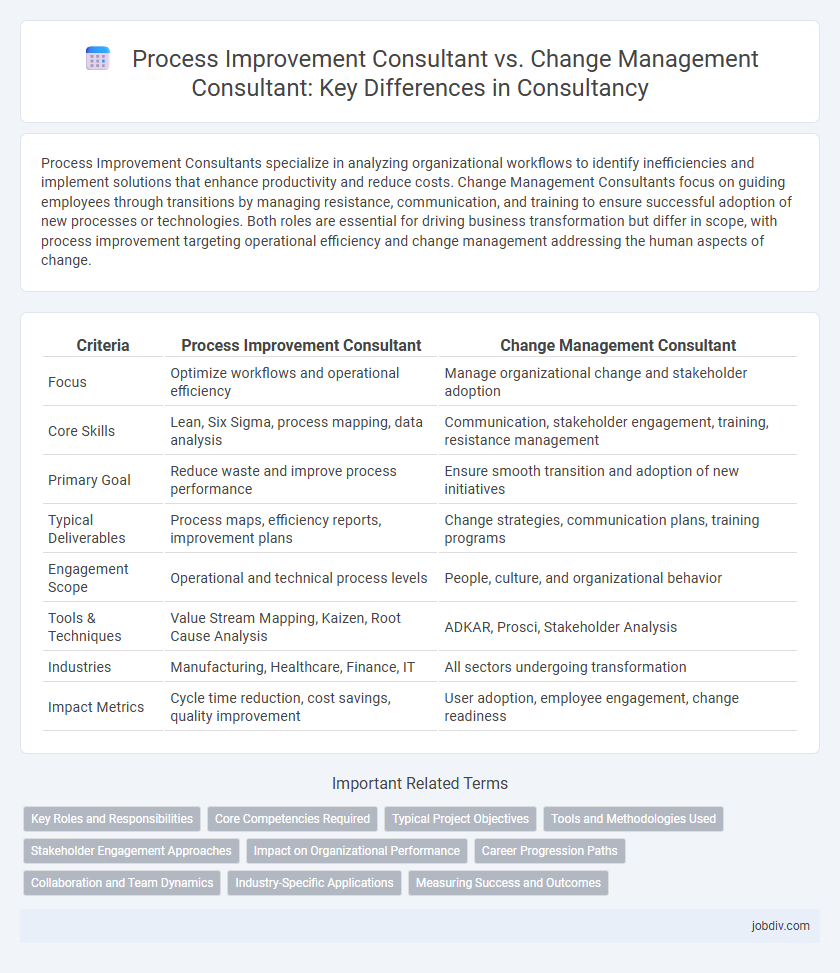Process Improvement Consultants specialize in analyzing organizational workflows to identify inefficiencies and implement solutions that enhance productivity and reduce costs. Change Management Consultants focus on guiding employees through transitions by managing resistance, communication, and training to ensure successful adoption of new processes or technologies. Both roles are essential for driving business transformation but differ in scope, with process improvement targeting operational efficiency and change management addressing the human aspects of change.
Table of Comparison
| Criteria | Process Improvement Consultant | Change Management Consultant |
|---|---|---|
| Focus | Optimize workflows and operational efficiency | Manage organizational change and stakeholder adoption |
| Core Skills | Lean, Six Sigma, process mapping, data analysis | Communication, stakeholder engagement, training, resistance management |
| Primary Goal | Reduce waste and improve process performance | Ensure smooth transition and adoption of new initiatives |
| Typical Deliverables | Process maps, efficiency reports, improvement plans | Change strategies, communication plans, training programs |
| Engagement Scope | Operational and technical process levels | People, culture, and organizational behavior |
| Tools & Techniques | Value Stream Mapping, Kaizen, Root Cause Analysis | ADKAR, Prosci, Stakeholder Analysis |
| Industries | Manufacturing, Healthcare, Finance, IT | All sectors undergoing transformation |
| Impact Metrics | Cycle time reduction, cost savings, quality improvement | User adoption, employee engagement, change readiness |
Key Roles and Responsibilities
Process Improvement Consultants specialize in analyzing existing workflows to identify inefficiencies and implement strategies such as Lean, Six Sigma, and Kaizen for operational excellence. Change Management Consultants focus on guiding organizations through transitions by developing communication plans, stakeholder engagement strategies, and training programs to ensure smooth adoption of new processes or technologies. Both roles require strong analytical skills, but Process Improvement emphasizes technical workflow optimization while Change Management centers on human factors and organizational behavior.
Core Competencies Required
Process Improvement Consultants require expertise in data analysis, process mapping, and Lean Six Sigma methodologies to optimize workflows and enhance operational efficiency. Change Management Consultants need strong skills in stakeholder engagement, communication strategies, and organizational behavior to effectively manage transitions and minimize resistance. Both roles demand strategic thinking and problem-solving abilities to drive sustainable business transformation.
Typical Project Objectives
Process Improvement Consultants aim to enhance operational efficiency by identifying bottlenecks, streamlining workflows, and reducing costs to increase overall productivity. Change Management Consultants focus on facilitating smooth transitions during organizational changes by ensuring stakeholder engagement, minimizing resistance, and embedding new behaviors. Typical project objectives for Process Improvement include process optimization and waste reduction, while Change Management projects prioritize adoption rates and communication effectiveness.
Tools and Methodologies Used
Process Improvement Consultants primarily utilize Lean, Six Sigma, and Kaizen methodologies to analyze workflow inefficiencies and implement data-driven solutions, often employing tools like value stream mapping and root cause analysis. Change Management Consultants focus on frameworks such as ADKAR, Kotter's 8-Step Process, and Prosci methodologies to guide organizational transitions, leveraging communication plans, stakeholder analysis, and resistance management tools. Both roles integrate software solutions like process mapping tools and project management platforms to support effective transformation initiatives.
Stakeholder Engagement Approaches
Process Improvement Consultants utilize data-driven techniques like Six Sigma and Lean to engage stakeholders by mapping current workflows and identifying inefficiencies, ensuring targeted improvements with measurable outcomes. Change Management Consultants emphasize communication strategies, stakeholder analysis, and emotional buy-in to facilitate adoption of new processes and minimize resistance. Both roles prioritize tailored engagement plans, but Process Improvement leans on quantitative metrics, whereas Change Management focuses on behavioral and organizational dynamics.
Impact on Organizational Performance
A Process Improvement Consultant enhances organizational performance by identifying inefficiencies and implementing streamlined workflows that reduce costs and increase productivity. In contrast, a Change Management Consultant focuses on guiding employees through transitions to ensure adoption and minimize resistance, thus securing sustainable improvements. Both roles directly impact operational success, with Process Improvement driving efficiency and Change Management fostering employee engagement and resilience.
Career Progression Paths
Process Improvement Consultants typically advance by gaining expertise in methodologies like Lean Six Sigma and expanding their role to lead complex operational transformations within organizations. Change Management Consultants often progress by deepening skills in stakeholder engagement and organizational behavior, eventually managing large-scale change initiatives and advising C-suite executives. Both career paths offer opportunities to evolve into strategic roles such as Transformation Manager or Executive Consultant, emphasizing leadership in driving business growth and innovation.
Collaboration and Team Dynamics
Process Improvement Consultants analyze workflows and identify inefficiencies, collaborating closely with cross-functional teams to streamline operations and enhance productivity. Change Management Consultants focus on guiding teams through organizational transformations, emphasizing communication strategies and employee engagement to foster adaptability. Both roles require strong interpersonal skills, but Process Improvement prioritizes operational collaboration while Change Management centers on managing team dynamics during transitions.
Industry-Specific Applications
Process Improvement Consultants specialize in streamlining operations within industry-specific contexts such as manufacturing, healthcare, or finance, using methodologies like Lean, Six Sigma, and Kaizen to enhance efficiency and reduce waste. Change Management Consultants focus on guiding organizational transitions tailored to sector-specific challenges, ensuring stakeholder engagement, minimizing resistance, and aligning change initiatives with corporate culture and regulatory requirements. Both roles require deep industry knowledge to implement customized strategies that drive sustainable performance improvements and competitive advantages.
Measuring Success and Outcomes
Process Improvement Consultants measure success through key performance indicators (KPIs) such as cycle time reduction, cost savings, and quality enhancements linked to optimized workflows. Change Management Consultants focus on adoption rates, employee engagement levels, and the sustainability of behavioral changes to assess impact. Both roles utilize data-driven metrics but differ in targeting operational efficiency versus organizational adaptability.
Process Improvement Consultant vs Change Management Consultant Infographic

 jobdiv.com
jobdiv.com